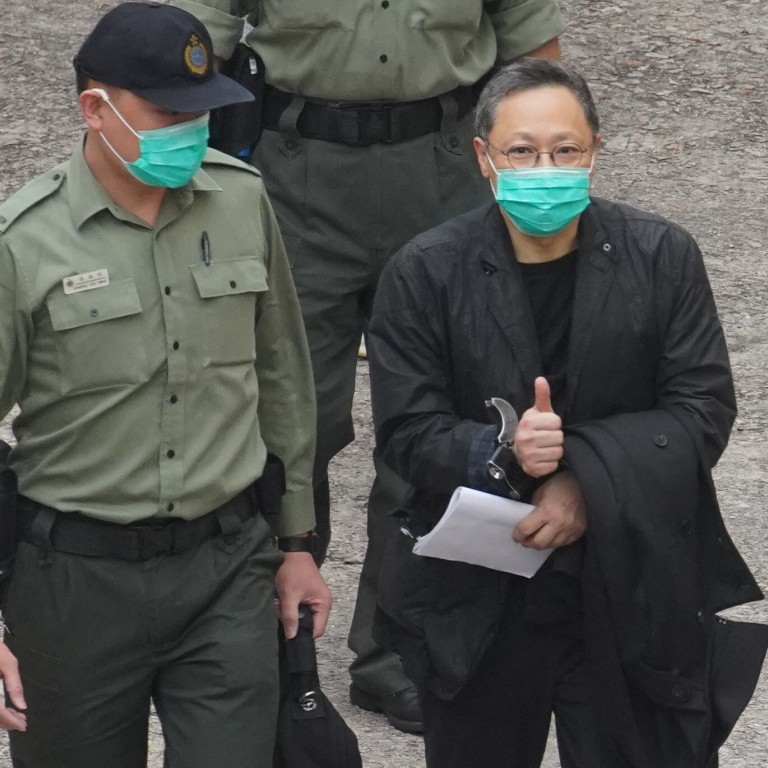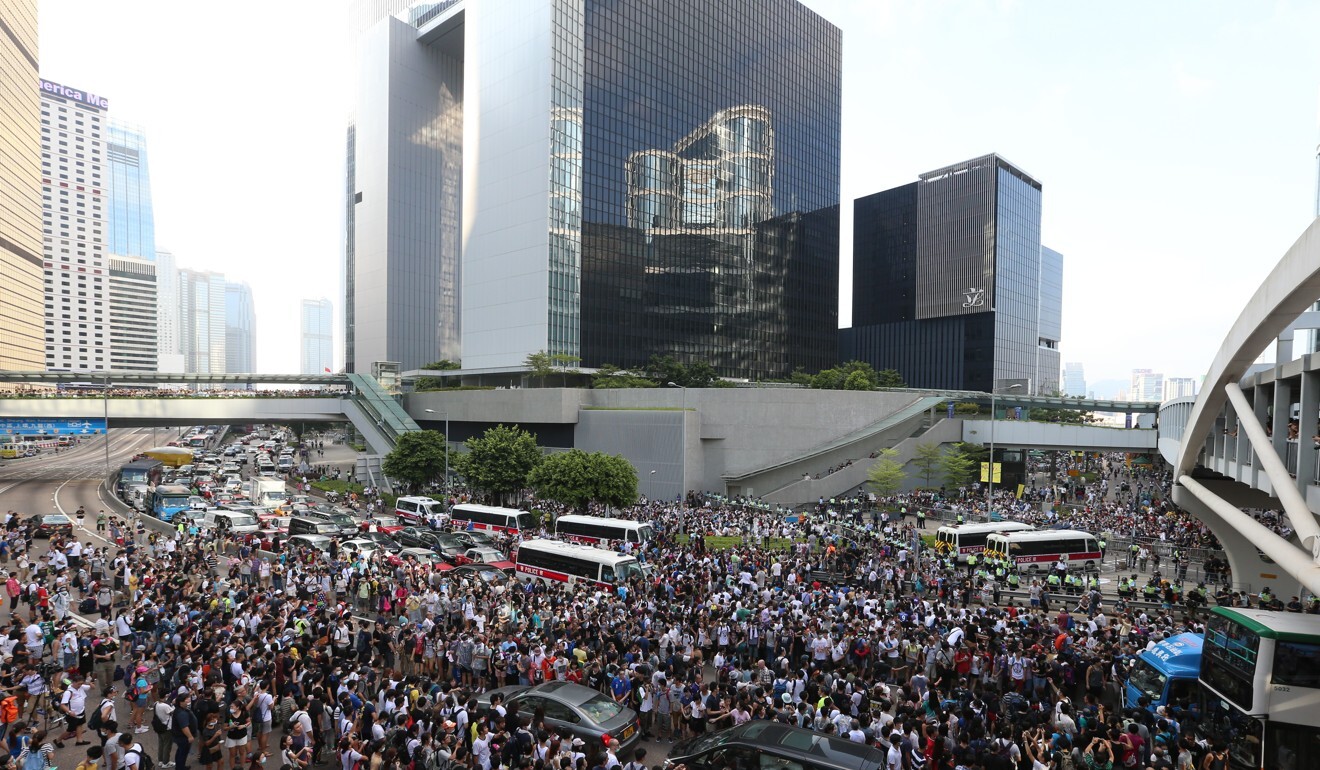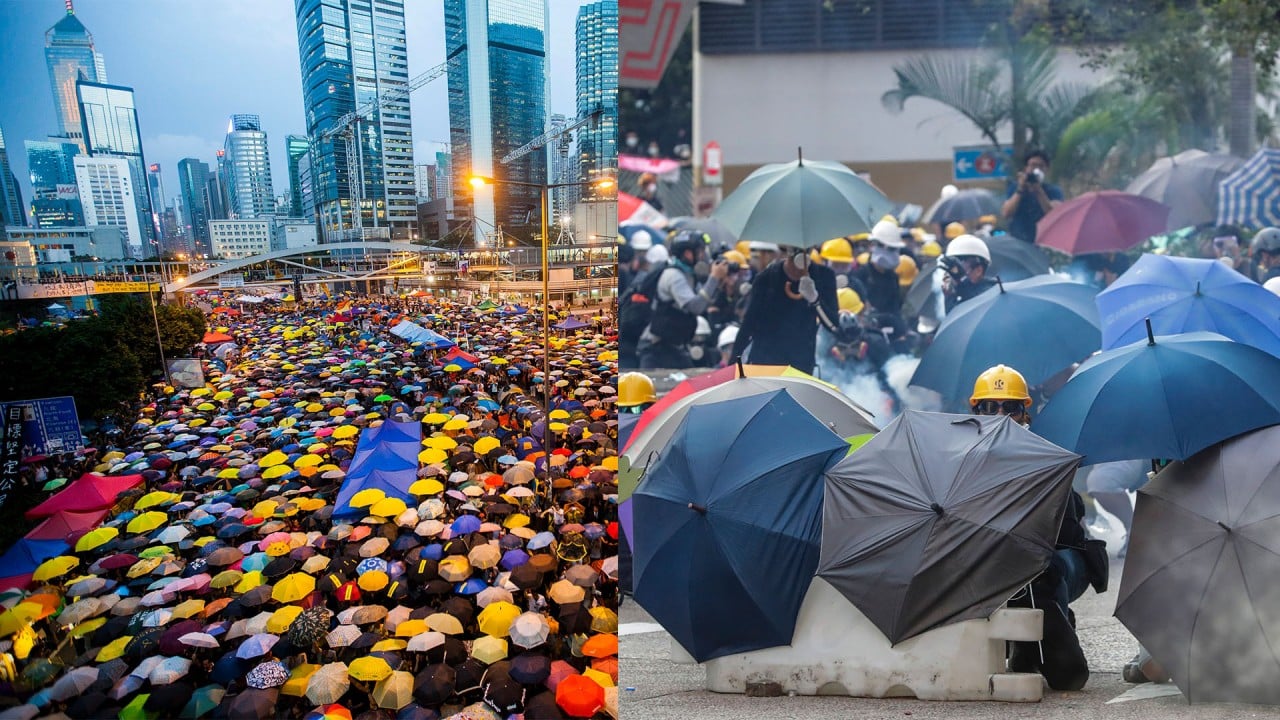
Benny Tai sent back to jail to await Hong Kong court’s ruling in Occupy Central appeal
- Court of Appeal revokes Tai’s bail after prosecutors object to his release on the grounds he was ‘alleged to have committed a crime’ while out on bail
- Tai and his co-defendants, Chan Kin-man and Chu Yiu-ming, are appealing against their convictions on public nuisance charges over the 2014 protest movement
The Court of Appeal reserved judgment on the long-awaited appeal on Thursday, and revoked Tai’s bail at the conclusion of the three-day hearing.
Prosecutors had objected to Tai’s release on the grounds he was “alleged to have committed a crime” while out on court bail.
The 56-year-old legal scholar and the movement’s two other co-founders – retired sociologist Chan Kin-man, 62, and Reverend Chu Yiu-ming, 77 – were among nine democracy advocates returning to court this week in a bid to overturn their 2019 convictions on a string of public nuisance charges over their roles in the 79-day protests that brought parts of the city to a standstill.

Tai was granted bail in August 2019, after serving five months and 21 days of a 16-month jail term meted out by the District Court on one count of conspiracy to cause a public nuisance, and another of incitement.
In seeking to reduce that term, lawyer Randy Shek argued the lower court had imposed a “manifestly excessive” sentence, and erred in principle by considering these peaceful protests as falling “outside the parameters of civil disobedience” and ignoring his fundamental right to assembly.
Shek also disagreed with the sentencing judge’s assessment of Tai’s culpability, and questioned the extent to which he should be held responsible for the events that transpired from his original five-day campaign to “occupy Central with love and peace”, especially when he had left the occupation a month after it began in Admiralty on September 28, 2014.
“There is a chilling effect if this conduct is met with a sentence that is too harsh,” Shek told the three-judge panel, which included the court’s vice-president Mr Justice Andrew Macrae, and madam justices Maggie Poon Man-kay and Anthea Pang Po-kam.
Court hears Occupy co-founders merely engaged in ‘conspiracy to inspire’
But acting director of public prosecutions William Tam Yiu-ho SC countered that Tai had crossed the line separating the lawful and unlawful exercise of his rights by unlawfully interfering with the rights of others, and “was still unrepentant”, despite having taken the public well-being into hostage under the “veneer of the message of love and peace”.
The top prosecutor urged the court to consider the impact of the case, noting that Tai’s conduct had sent out a “dangerous message” and the obstruction of roads at the time were “not unfamiliar to what we have seen in recent years”.
“It has taken generations for the Hong Kong people to know the importance of the rule of law,” Tam said. “When there’s a red light, we don’t cross it.
“The offence in this case involves inciting a large number of participants to openly breach the law. It sent a wrong message, a dangerous message, to the community – and that was planted back in 2014. The offence encourages people to take the concept that you can take the law into your own hands.”

08:41
Five years after Occupy: comparing Hong Kong’s 2014 movement with the 2019 extradition bill protests
The nine were the final group to be tried by a court over the 2014 protest, also known as the “umbrella movement”, which they thought would drive political change in Hong Kong.
The protests were sparked by frustration with a restrictive proposal Beijing issued for the procedure for electing Hong Kong’s leader. Democracy advocates were upset the proposal lacked an option that would allow them to nominate candidates.
Tai and Chan were ultimately jailed for 16 months on one count of conspiracy to cause a public nuisance and another of inciting others to do the same. Chu, who was also convicted on the conspiracy charge, had his 16-month sentence suspended because of health concerns.
Hong Kong’s exiled dissidents: world’s listening, but for how long?
Former opposition lawmaker Shiu Ka-chun, 51, and League of Social Democrats chairman Raphael Wong Ho-ming, 30 – who were both found guilty of one count each of incitement to commit a public nuisance and incitement to incite a public nuisance – were jailed for eight months.
Ex-student leaders Tommy Cheung Sau-yin, 25, and Eason Chung Yiu-wa, 26, were sentenced to 200 hours of community service and a suspended jail term respectively after being found guilty of the same two charges as Wong and Shiu.
Another ex-lawmaker, Tanya Chan, 49, was found guilty of the same charges and was handed a suspended sentence, as was her fellow former legislator Lee Wing-tat, 65, was convicted of one count of incitement.

